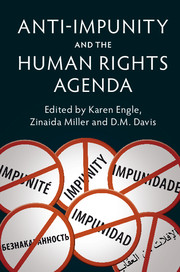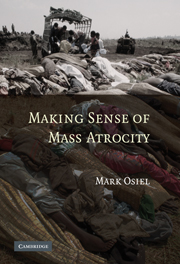Anti-Impunity and the Human Rights Agenda
- Editors:
- Karen Engle, University of Texas, Austin, School of Law
- Zinaida Miller, Seton Hall University, School of Diplomacy and International Relations
- D. M. Davis, University of Cape Town Faculty of Law
- Date Published: December 2016
- availability: In stock
- format: Paperback
- isbn: 9781107439221
Paperback
Other available formats:
Hardback, eBook
Looking for an inspection copy?
This title is not currently available on inspection
-
In the twenty-first century, fighting impunity has become both the rallying cry and a metric of progress for human rights. The new emphasis on criminal prosecution represents a fundamental change in the positions and priorities of students and practitioners of human rights and transitional justice: it has become almost unquestionable common sense that criminal punishment is a legal, political, and pragmatic imperative for addressing human rights violations. This book challenges that common sense. It does so by documenting and critically analyzing the trend toward an anti-impunity norm in a variety of institutional and geographical contexts, with an eye toward the interaction between practices at the global and local levels. Together, the chapters demonstrate how this laser focus on anti-impunity has created blind spots in practice and in scholarship that result in a constricted response to human rights violations, a narrowed conception of justice, and an impoverished approach to peace.
Read more- Identifies and critically analyses a major trend in international law and human rights
- Considers case studies from a number of institutions, regions, and countries
- Written with an interdisciplinary focus, which will appeal to scholars of law, political science, history, and anthropology
Reviews & endorsements
'This is an exceptional edited volume. Whereas most edited volumes, unfortunately, do not go beyond collecting various perspectives on a theme, this book presents a clear argument: the anti-impunity turn in human rights law is not a linear development of progress and can have dangerous consequences. In setting forth these consequences, and analysing alternatives to the modus of criminal justice that the anti-impunity struggle has chosen as its preferred instrument, the book offers avenues towards richer and thicker conceptions and experiences of justice.' Sarah Nouwen, Co-Deputy Director of the Lauterpacht Centre for International Law, University of Cambridge
See more reviews'This is the first sustained analysis of the 'anti-impunity' norm and discourse associated with the human rights movement. At the center of the project is the ambition to make the familiar strange and to expose taken-for-granted assumptions and identifications to critical scrutiny in a way that poses a powerful challenge to norms that frame contemporary international politics and interventions. … This book should be of great interest to a wide audience of scholars and policymakers. It articulates a direct rejoinder to what remains the dominant or conventional view among human rights scholars regarding the anti-impunity norm, while charting the path to a broader debate on the role of the human rights movement more generally.' Bronwyn Leebaw, University of California, Riverside
'An urgent question of political strategy drives this extraordinary collection: when should people of good heart embrace the national or international machinery of government, prosecution and punishment? And when should they resist, seek alternate paths to justice, speak truth to the power of the state or the international community? The human rights movement offers a half-century case study, shifting sharply from international calls for 'amnesty' when states abuse their penal authority to a full-bore embrace of criminal punishment and 'no impunity.' To figure out what happened, what worked and what didn't, the editors have curated a discussion among our most reflective and engaged scholars of international law, writing at their best. The result is challenging and surprising: crucial reading for anyone thinking strategically about ethics and global justice.' David Kennedy, Manley O. Hudson Professor of Law, Harvard Law School, Massachusetts
'Put simply, the turn to criminal repression of international human rights law is one of the most intriguing global legal developments of the last decades. Anti-Impunity and the Human Rights Agenda not only does a great job of showing how dominant a move this has become, it also spares no effort in showing how contested, ambiguous, productive, and paradoxical that move is. A welcome problematization of what has become one of the great obsessions of our times.' Frédéric Mégret, McGill University, Montréal
'They conclude that a laser focus on anti-impunity has created blind spots in both practice and scholarship that result in a constricted response to human rights violations, a narrowed conception of justice, and an impoverished approach to peace.' Law and Social Inquiry
Customer reviews
Not yet reviewed
Be the first to review
Review was not posted due to profanity
×Product details
- Date Published: December 2016
- format: Paperback
- isbn: 9781107439221
- length: 398 pages
- dimensions: 227 x 151 x 20 mm
- weight: 0.56kg
- contains: 1 b/w illus. 1 table
- availability: In stock
Table of Contents
Introduction
Part I. What Does Anti-Impunity Mean?:
1. A genealogy of the criminal turn in human rights Karen Engle
2. Anti-impunity as deflection of argument Samuel Moyn
3. Doing history with impunity Vasuki Nesiah
Part II. How and Where Does Anti-Impunity Operate?:
4. The South African Truth Commission and the AZAPO case: a reflection almost two decades later D. M. Davis
5. Anti-impunity politics in post-genocide Rwanda Zinaida Miller
6. Whose exceptionalism? Debating the inter-American view on amnesty and the Brazilian case Fabia Fernandes Carvalho Veçoso
7. The distributive politics of impunity and anti-impunity: lessons from four decades of Colombian peace negotiations Helena Alviar García and Karen Engle
8. From political repression to torturer impunity: the narrowing of Filártiga v. Peña-Irala Natalie R. Davidson
Part III. Are There Alternatives to Anti-Impunity?:
9. Impunity in a different register: people's tribunals and questions of judgment, law and responsibility Dianne Otto
10. Beyond Nuremberg: the historical significance of the post-Apartheid transition in South Africa Mahmood Mamdani.
Sorry, this resource is locked
Please register or sign in to request access. If you are having problems accessing these resources please email [email protected]
Register Sign in» Proceed
You are now leaving the Cambridge University Press website. Your eBook purchase and download will be completed by our partner www.ebooks.com. Please see the permission section of the www.ebooks.com catalogue page for details of the print & copy limits on our eBooks.
Continue ×Are you sure you want to delete your account?
This cannot be undone.
Thank you for your feedback which will help us improve our service.
If you requested a response, we will make sure to get back to you shortly.
×


